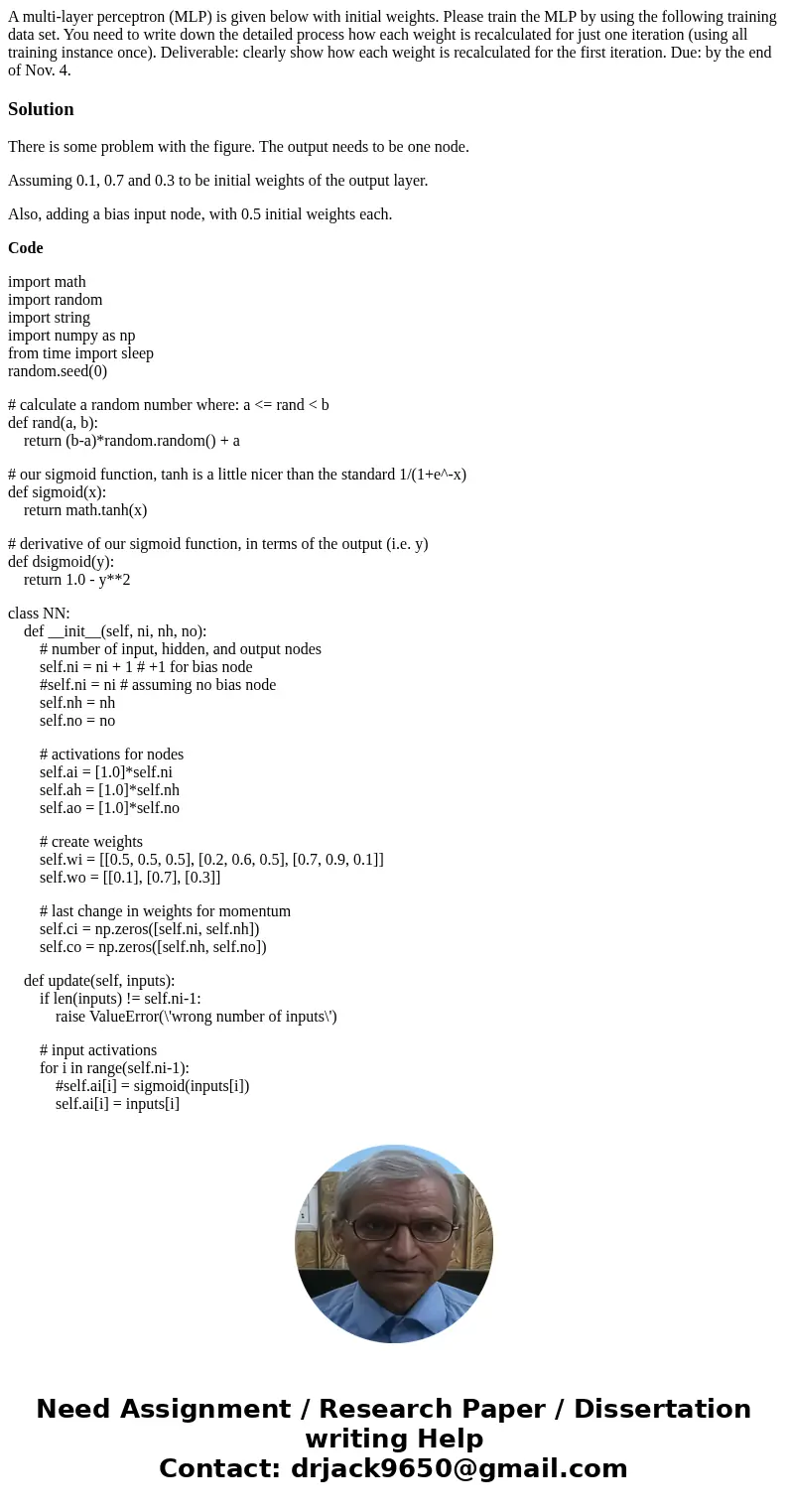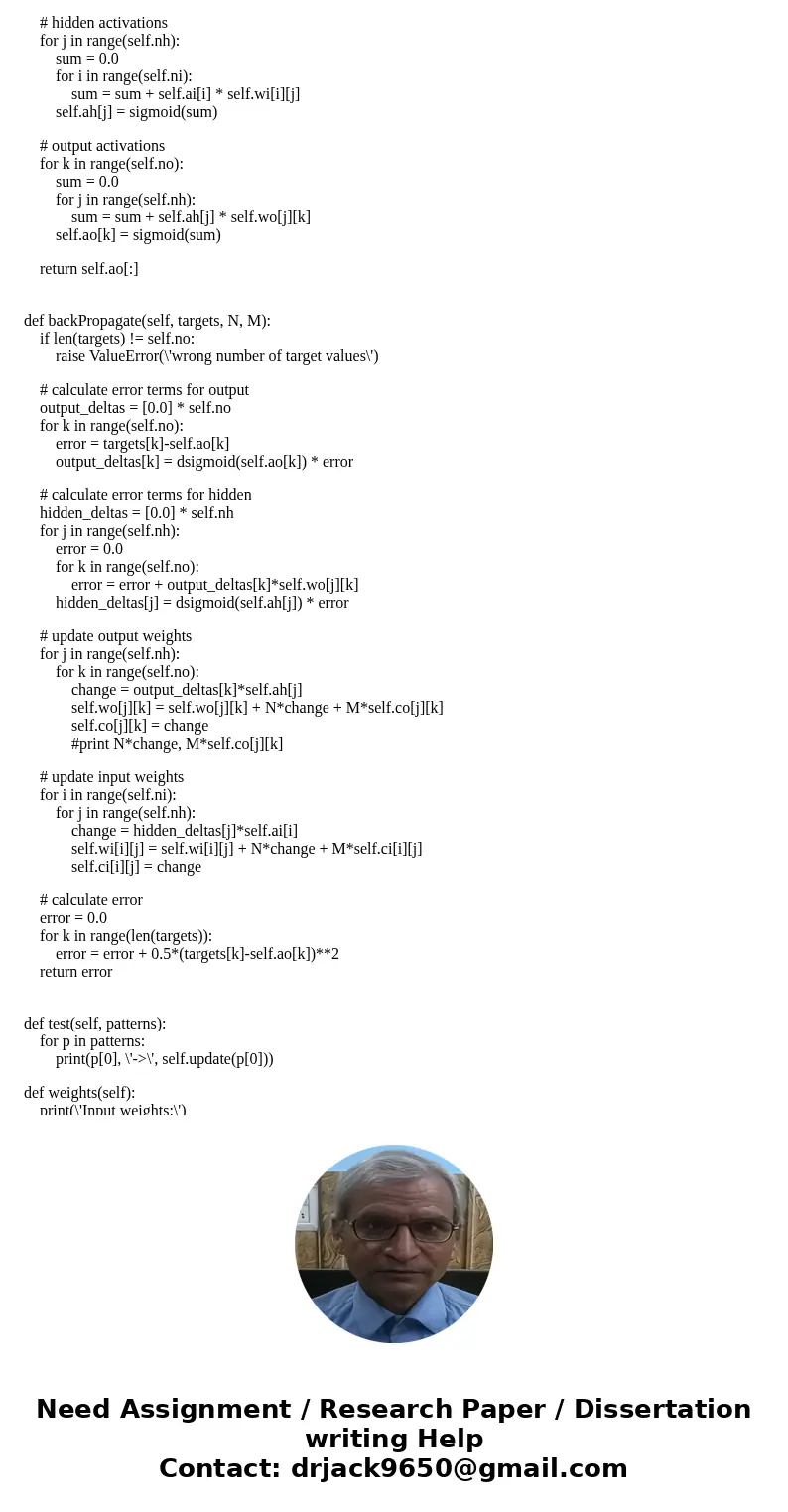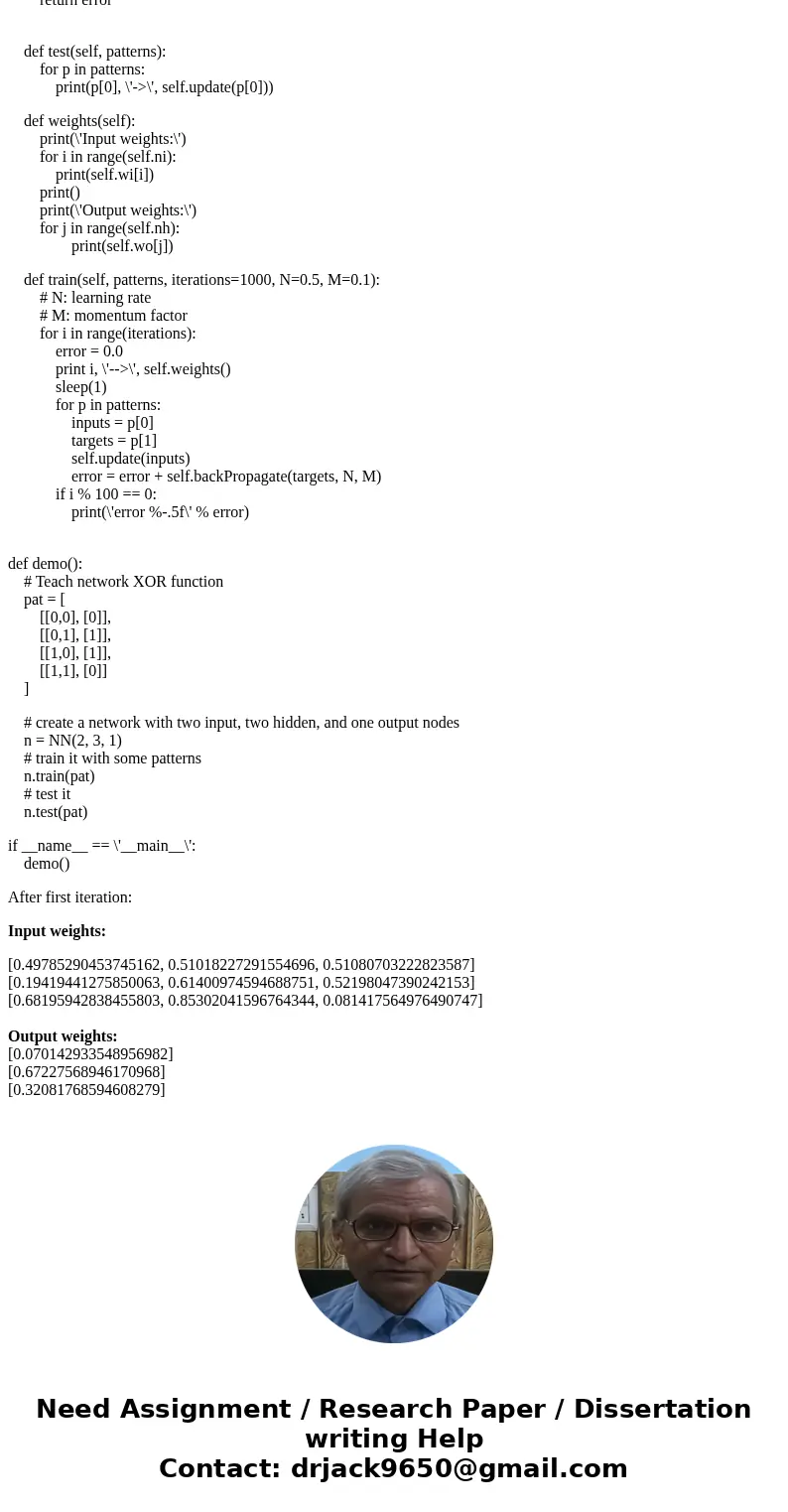A multilayer perceptron MLP is given below with initial weig
Solution
There is some problem with the figure. The output needs to be one node.
Assuming 0.1, 0.7 and 0.3 to be initial weights of the output layer.
Also, adding a bias input node, with 0.5 initial weights each.
Code
import math
import random
import string
import numpy as np
from time import sleep
random.seed(0)
# calculate a random number where: a <= rand < b
def rand(a, b):
return (b-a)*random.random() + a
# our sigmoid function, tanh is a little nicer than the standard 1/(1+e^-x)
def sigmoid(x):
return math.tanh(x)
# derivative of our sigmoid function, in terms of the output (i.e. y)
def dsigmoid(y):
return 1.0 - y**2
class NN:
def __init__(self, ni, nh, no):
# number of input, hidden, and output nodes
self.ni = ni + 1 # +1 for bias node
#self.ni = ni # assuming no bias node
self.nh = nh
self.no = no
# activations for nodes
self.ai = [1.0]*self.ni
self.ah = [1.0]*self.nh
self.ao = [1.0]*self.no
# create weights
self.wi = [[0.5, 0.5, 0.5], [0.2, 0.6, 0.5], [0.7, 0.9, 0.1]]
self.wo = [[0.1], [0.7], [0.3]]
# last change in weights for momentum
self.ci = np.zeros([self.ni, self.nh])
self.co = np.zeros([self.nh, self.no])
def update(self, inputs):
if len(inputs) != self.ni-1:
raise ValueError(\'wrong number of inputs\')
# input activations
for i in range(self.ni-1):
#self.ai[i] = sigmoid(inputs[i])
self.ai[i] = inputs[i]
# hidden activations
for j in range(self.nh):
sum = 0.0
for i in range(self.ni):
sum = sum + self.ai[i] * self.wi[i][j]
self.ah[j] = sigmoid(sum)
# output activations
for k in range(self.no):
sum = 0.0
for j in range(self.nh):
sum = sum + self.ah[j] * self.wo[j][k]
self.ao[k] = sigmoid(sum)
return self.ao[:]
def backPropagate(self, targets, N, M):
if len(targets) != self.no:
raise ValueError(\'wrong number of target values\')
# calculate error terms for output
output_deltas = [0.0] * self.no
for k in range(self.no):
error = targets[k]-self.ao[k]
output_deltas[k] = dsigmoid(self.ao[k]) * error
# calculate error terms for hidden
hidden_deltas = [0.0] * self.nh
for j in range(self.nh):
error = 0.0
for k in range(self.no):
error = error + output_deltas[k]*self.wo[j][k]
hidden_deltas[j] = dsigmoid(self.ah[j]) * error
# update output weights
for j in range(self.nh):
for k in range(self.no):
change = output_deltas[k]*self.ah[j]
self.wo[j][k] = self.wo[j][k] + N*change + M*self.co[j][k]
self.co[j][k] = change
#print N*change, M*self.co[j][k]
# update input weights
for i in range(self.ni):
for j in range(self.nh):
change = hidden_deltas[j]*self.ai[i]
self.wi[i][j] = self.wi[i][j] + N*change + M*self.ci[i][j]
self.ci[i][j] = change
# calculate error
error = 0.0
for k in range(len(targets)):
error = error + 0.5*(targets[k]-self.ao[k])**2
return error
def test(self, patterns):
for p in patterns:
print(p[0], \'->\', self.update(p[0]))
def weights(self):
print(\'Input weights:\')
for i in range(self.ni):
print(self.wi[i])
print()
print(\'Output weights:\')
for j in range(self.nh):
print(self.wo[j])
def train(self, patterns, iterations=1000, N=0.5, M=0.1):
# N: learning rate
# M: momentum factor
for i in range(iterations):
error = 0.0
print i, \'-->\', self.weights()
sleep(1)
for p in patterns:
inputs = p[0]
targets = p[1]
self.update(inputs)
error = error + self.backPropagate(targets, N, M)
if i % 100 == 0:
print(\'error %-.5f\' % error)
def demo():
# Teach network XOR function
pat = [
[[0,0], [0]],
[[0,1], [1]],
[[1,0], [1]],
[[1,1], [0]]
]
# create a network with two input, two hidden, and one output nodes
n = NN(2, 3, 1)
# train it with some patterns
n.train(pat)
# test it
n.test(pat)
if __name__ == \'__main__\':
demo()
After first iteration:
Input weights:
[0.49785290453745162, 0.51018227291554696, 0.51080703222823587]
[0.19419441275850063, 0.61400974594688751, 0.52198047390242153]
[0.68195942838455803, 0.85302041596764344, 0.081417564976490747]
Output weights:
[0.070142933548956982]
[0.67227568946170968]
[0.32081768594608279]



 Homework Sourse
Homework Sourse